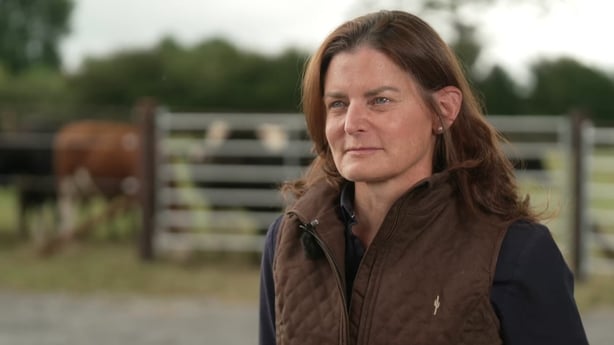In a busy farming supplies store in Tullamore, Co Offaly, an entire wall is given over to medicinal products for animals.
Specifically, antiparasitic drugs. Farmers are used to buying these products as and when they want to dose their animals for parasites, but soon this will no longer be possible.
A statutory instrument signed last week by Minister for Agriculture Charlie McConalogue has meant that these products will only be available with a prescription.
Ollie Ryan, the owner of Midland Veterinary, says the new regulations will be tough for licensed merchants to bear, particularly smaller outfits. On average, antiparasitics account for 25% of their turnover.
It won't just affect retailers. Prime Time has also spoken to farmers who say the additional step of first obtaining a prescription will likely cost them money.
This change has been a long time coming. An EU Regulation dating back to 2006 made it compulsory for member states to treat antiparasitics, also called anthelmintics, as prescription only.
While other European countries complied, Ireland was slow to act, using a derogation that allowed a "suitably qualified person" to dispense the drugs without the need for a veterinary prescription.
The signing of the statutory instrument last week is the culmination of years of fraught negotiation between the Department of Agriculture and a long list of stakeholders including farming bodies, vets, the co-op movement and licensed merchants.
EU Regulation 2019/6 was introduced to address the growing problem of antiparasitic resistance in agricultural production.
Essentially, parasites in food-producing animals are evolving and becoming resistant to these critical drugs.
If unnecessary use of antiparasitics is not driven down, the medicines will become ineffective and with no drugs currently in development, we are unlikely to see any new product on the market in the next twenty years.
'Undermining veterinary code of conduct’
It is not just farmers and retailers who are concerned about the directive. Vets are also raising issues.
Under the Veterinary Medicinal Products Regulations 2024, antiparasitics will become prescription-only, but co-ops and licensed merchants will be able to continue selling them, by engaging a practising vet to issue the prescriptions first.
However, this vet will never have to examine the animals, or see them, or even step foot on the farm.
The drugs can be prescribed using a "proper assessment protocol", a process that many vets say is neither proper nor a real assessment.
The Department of Agriculture told Prime Time that this will only apply in a limited number of circumstances, such as antiparasitics, but never for therapeutic medicines needed when an animal is clinically ill.

Dr Siobhan McAuliffe is a vet and equine medicine specialist. She says that a critical aspect of Irish veterinary medicine is the "client-patient practice relationship", essentially the vet examining the animals first hand and diagnosing or prescribing on that basis.
She claims that new regulations have undermined this. "You can really only write a prescription for the animals that you know and the farm that you know, because every farm is different."
Throughout the negotiations, the case made by both the Irish co-ops and licensed merchants was that losing the antiparasitic market would be hugely detrimental to the market and would lead to retailers closing.
With the regulations now signed into law, they say that smaller outlets will still struggle, as they are unlikely to be able to bear the cost of engaging or employing a practising vet.
Ray Doyle is the Livestock and Environmental Director with the Irish Co-operative Organisation Society.
He maintains that the new system will not be compromised by the vets being employed by the retailers or by those vets issuing prescriptions without physically inspecting the animals themselves.
"The vets that we will be employing can only make a prescription based on actual data... so the notion that we're going to have a vet just simply stamping a prescription willy-nilly and not having any regard to resistance to products used, that is completely false."

Veterinary Ireland has said the new regulations have undermined its ability to address growing antiparasitic resistance.
With no requirement for that client-patient practice relationship and a conflicting definition of vets’ on-call obligations, the Veterinary Council of Ireland’s existing code of conduct is now incompatible with the new legislation.
"By removing this client-patient practise relationship or the requirement for it in the writing of prescriptions, that's directly against the current veterinary code of practise as it is written," Dr McAuliffe told Prime Time.
"The statutory instrument would be seen as the superior law in this case, so the veterinary code of conduct would have to be rewritten to accommodate that."
The debate over the regulation of antiparasitic drugs has been a bitter one. But the lucrative vaccine market has been another battleground in the long war over this legislation.
Both retailers and farmers had hoped that the statutory instrument would also make provision for them to sell vaccines in their stores. But this has not happened.

Denis Drennan, a dairy farmer and president of the ICMSA, says vets are not the most suitable source for farmers to access vaccines because they cannot be expected to fund or extend credit to farmers who require vaccines but are in financial difficulty.
"We want maximum availability of vaccines and the co-ops are the best structure for that because they’re owned by farmers for farmers and they’re in the position that they can take the cost and let the farmer pay when he’s in a position to pay."
For Ollie Ryan, it means that vaccines won’t replace the trade lost through over-the-counter sales of antiparasitics.
He says it is going to be bigger issue among smaller retailers. He adds that greater availability of vaccines would mean that farmers will use less antiparasitic medication.
"These vaccines are now a monopoly. They're in the control of vets and a small number of pharmacists. And in my view, it's a missed opportunity by the minister."
The new regulations may be seen as an Irish solution to a European problem.
It could be the sign of a good compromise that there are now complaints from all parties, or that to please everyone, the minister has left everybody unhappy.






